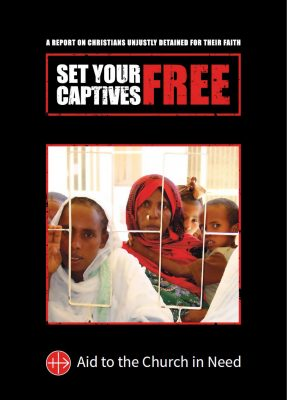Entitled, “Set Your Captives Free”, the report by the Pontifical Foundation Aid to the Church in Need, lists specific cases of Christians detained mainly in Nigeria, Eritrea, Pakistan and China.
It speaks about imprisonment for reasons of conscience, arbitrary detention, unjust trials, inadequate prison conditions, cases of torture and pressure to induce people to abandon the faith.
It was released on Nov. 25 to mark Red Wednesday. During Red Wednesday, many church buildings and monuments are illuminated in red light, a colour associated with martyrdom, to remember those who cannot practice their faith freely throughout the world.
Africa
ACN regards the kidnapping of Christians in Nigeria as very serious. Every year more than 220 million faithful are kidnapped and unjustly imprisoned by groups of jihadist militiamen. Kidnappings for ransom often result in the killing of Protestant and Catholic priests.
It is the same story in Egypt, where “young Coptic Christian women are kidnapped and forced to marry their non-Christian kidnappers”. In Eritrea, more than a thousand Christian faithful are feared to be unjustly detained.
Asia
In Asia, the scenario is equally alarming. In Pakistan, “there are about a thousand cases of forced conversions of Christian and Hindu girls and young women annually”. In North Korea there are “about 50,000 Christians in labour camps, that is, almost 50 percent of the total number of prisoners.”
In Myanmar, it is estimated that since 2018, the army has interrogated and arrested 100 pastors and forcibly recruited Christian students.
Covid-19
“Set Your Captives Free” also underlines the devastating and unprecedented impact that Covid-19 has had on unjust detention.
ACN singles out three key factors that have caused a worsening of the situation. Firstly, the partial or total closure of the law courts and other legal activities delayed the appeal of jailed Christians. Secondly, as religious services moved online due to the lockdown, authoritarian governments have been able to increase surveillance and repression of those found to participate in alleged illegal activities. Lastly, the pandemic provided the persecutors with the opportunity to strike while all the attention was focused on the coronavirus emergency.
Christians are most persecuted
According to ACN, numerous specialized reports show that Christians are the most targeted religious community in the world.
According to the Pew Research Center, “the unjust detention of Christians, both by states and non-governmental subjects, emerges as a violation of human rights in 143 countries where there is serious harassment.” It also highlights a high number of “minority religious groups affected by unjust detention” and therefore reiterates the need to “act promptly” because religious minorities are increasingly at risk.
Asia Bibi
The ACN opens its report with two symbolic figures of persecution on the grounds of faith. The first is Asia Bibi, the Pakistani Christian woman falsely accused of blasphemy and imprisoned for nine years. She was acquitted in October 2018.
The preface to the ACN report bears her signature. “It is time to tell the truth to those who have the power so that those who, defying the law, detain innocent people are finally brought to justice,” Asia Bibi says in the preface. “It is time for governments to act. It is time to demonstrate in defence of our communities of the faithful, vulnerable, poor and persecuted. We must not stop until the oppressor finally hears our cry: ‘Set Your Captives Free’.”
Father Paolo Dall’Oglio
The second figure that the report, “Set Your Captives Free”, focuses on is Italian Jesuit priest and peace activist, Father Paolo Dall’Oglio, who was kidnapped in Syria on July 29, 2013.
“Few people have dealt with religious freedom as much as he, few have suffered more than him for their convictions,” ACN says.
Father Paolo is one of the five priests, including two bishops, kidnapped by ISIS in Syria in 2013. Aid to the Church in Need says no one knows where they are detained and whether they are dead or still alive.





